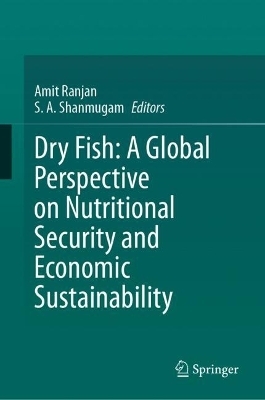
Dry Fish: A Global Perspective on Nutritional Security and Economic Sustainability
Springer International Publishing (Verlag)
978-3-031-62461-2 (ISBN)
Dry fish is an excellent and cheap source of protein and fat in both developed and developing nations, especially for vulnerable populations. Its nutritional value, cultural importance, and economic relevance make it an integral part of diets and food systems worldwide. The diverse culinary applications and international trade of dry fish further highlight its relevance and appeal on a global scale. It offers distinct taste and flavors, adding diversity to global cuisines and enhancing culinary experiences. It is used in various recipes, from stews and curries to snacks and condiments and is highly valued for its long shelf life and nutritional benefits. Consumption of dry fish not only improves nutrition but also has far-reaching impacts on the economy, society and cultural practices. It meets the dietary requirements of marginalized communities and contributes to food security. In coastal regions, salted and sun-dried fish are widely consumed, reflecting the importance of this preservation method. Dry fish plays a crucial role in nutritional security, particularly in coastal areas, where it holds immense importance for the economy, society, and culture. Dry fish also serves as a valuable commodity in international markets, fostering cross-cultural exchanges and contributing to trade flows. Furthermore, dry fish has gained popularity in various global cuisines. Countries like Portugal, Spain, Thailand and several African nations have their own versions of dried or salted fish dishes, reflecting the diverse culinary traditions and preferences around the world.
Dry Fish: A Global Perspective on Nutritional Security and Economic Sustainability offers a global perspective on the sustainability of dry fish production and its environmental implications. It explores traditional and advanced drying methods, their impact on fish stocks and potential strategies for sustainable practices. The text discusses the challenges and opportunitiesin the industry, such as market trends, consumer preferences and technological advancements. The book combines scientific research, case studies and expert insights to provide a comprehensive overview of the topic. It serves as a valuable resource for researchers, policymakers and professionals in the fields of nutrition, food security, fisheries and economic development. By highlighting the importance of dry fish as a global resource, the book aims to foster discussions and actions that promote the sustainable utilization of this valuable food source for the benefit of present and future generations.
Dr. Amit Ranjan, is an Assistant Professor in the Department of Fish Nutrition and Feed Technology at TNJFU-Institute of Fisheries Post Graduate Studies in Chennai, India
Dr. S. A. Shanmugam is a Professor & Head of the Department of Fish Processing Technology at TNJFU-Institute of Fisheries Post Graduate Studies in Chennai, India
Effect of Emerging Processing Technology on Nutritional Quality of Dry Fish.- Dry fish and its contribution to food and nutritional security.- Traditional and advanced methods of fish drying.- Different types of dry fish products: a country's perspective.- Dried fish and its role in the global economy.- Biochemical composition of dry fish.- Drying Induced Changes in Fish and Fishery Products.- Physical, chemical, and microbiological changes associated with dry fish.- Different packaging methods and materials for dry fish.- Socio-economical perspective of dried fish value chains.- Dry fish market and marketing channels: a global perspective.- Prevalence of Antimicrobial Resistance in dried fish and dried fish based products.- Application of metagenomics in dry fish microbial quality assessment.- Process of fish drying and marketing in coastal West Bengal: Prospect and Challenges.- Fermented products from dried indigenous fishes from Northeast India using traditional methods.- The Hidden Symphony of Dried Fish: Decoding the Bacterial Ensemble.
| Erscheinungsdatum | 15.08.2024 |
|---|---|
| Zusatzinfo | XVIII, 245 p. |
| Verlagsort | Cham |
| Sprache | englisch |
| Maße | 155 x 235 mm |
| Themenwelt | Naturwissenschaften ► Chemie ► Technische Chemie |
| Technik ► Lebensmitteltechnologie | |
| Schlagworte | culinary diversity • Dry fish • food security • food sustainability • Food Systems • Nutrient composition |
| ISBN-10 | 3-031-62461-0 / 3031624610 |
| ISBN-13 | 978-3-031-62461-2 / 9783031624612 |
| Zustand | Neuware |
| Informationen gemäß Produktsicherheitsverordnung (GPSR) | |
| Haben Sie eine Frage zum Produkt? |
aus dem Bereich


